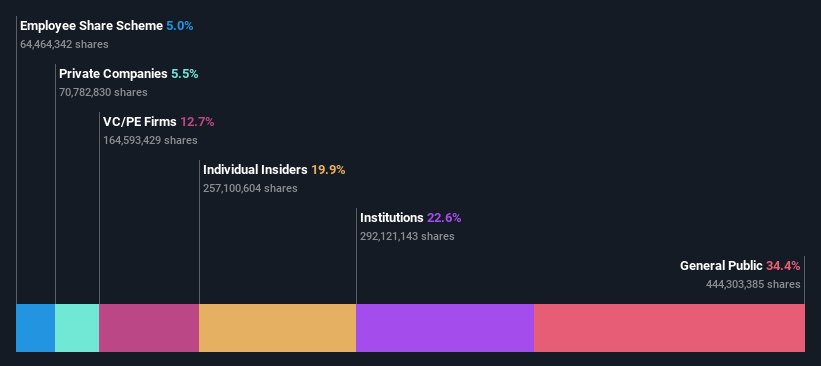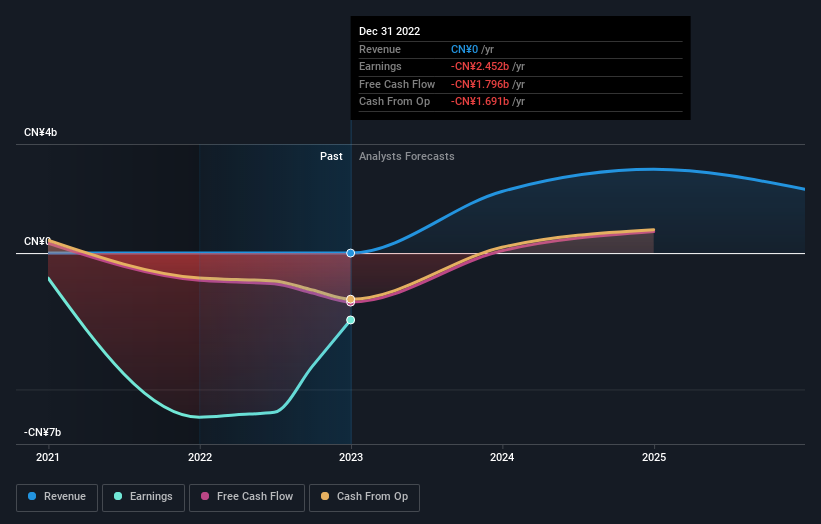Institutions along with retail investors who hold considerable shares inClover Biopharmaceuticals, Ltd. (HKG:2197) come under pressure; lose 16% of holdings value

Key Insights
- Significant control over Clover Biopharmaceuticals by retail investors implies that the general public has more power to influence management and governance-related decisions
- The top 7 shareholders own 52% of the company
- 20% of Clover Biopharmaceuticals is held by insiders
To get a sense of who is truly in control of Clover Biopharmaceuticals, Ltd. (HKG:2197), it is important to understand the ownership structure of the business. We can see that retail investors own the lion's share in the company with 34% ownership. Put another way, the group faces the maximum upside potential (or downside risk).
While institutions who own 23% came under pressure after market cap dropped to HK$1.8b last week,retail investors took the most losses.
In the chart below, we zoom in on the different ownership groups of Clover Biopharmaceuticals.
View our latest analysis for Clover Biopharmaceuticals

What Does The Institutional Ownership Tell Us About Clover Biopharmaceuticals?
Institutional investors commonly compare their own returns to the returns of a commonly followed index. So they generally do consider buying larger companies that are included in the relevant benchmark index.
Clover Biopharmaceuticals already has institutions on the share registry. Indeed, they own a respectable stake in the company. This suggests some credibility amongst professional investors. But we can't rely on that fact alone since institutions make bad investments sometimes, just like everyone does. When multiple institutions own a stock, there's always a risk that they are in a 'crowded trade'. When such a trade goes wrong, multiple parties may compete to sell stock fast. This risk is higher in a company without a history of growth. You can see Clover Biopharmaceuticals' historic earnings and revenue below, but keep in mind there's always more to the story.

We note that hedge funds don't have a meaningful investment in Clover Biopharmaceuticals. Because actions speak louder than words, we consider it a good sign when insiders own a significant stake in a company. In Clover Biopharmaceuticals' case, its Top Key Executive, Peng Liang, is the largest shareholder, holding 16% of shares outstanding. Hillhouse Investment Management, Ltd. is the second largest shareholder owning 13% of common stock, and Chengdu Tianhe Conventional Chinese and Medicine Technology Nurture Co. Ltd holds about 5.4% of the company stock. Furthermore, CEO Joshua G. Liang is the owner of 1.4% of the company's shares.
We also observed that the top 7 shareholders account for more than half of the share register, with a few smaller shareholders to balance the interests of the larger ones to a certain extent.
While it makes sense to study institutional ownership data for a company, it also makes sense to study analyst sentiments to know which way the wind is blowing. While there is some analyst coverage, the company is probably not widely covered. So it could gain more attention, down the track.
Insider Ownership Of Clover Biopharmaceuticals
The definition of an insider can differ slightly between different countries, but members of the board of directors always count. Company management run the business, but the CEO will answer to the board, even if he or she is a member of it.
I generally consider insider ownership to be a good thing. However, on some occasions it makes it more difficult for other shareholders to hold the board accountable for decisions.
Our most recent data indicates that insiders own a reasonable proportion of Clover Biopharmaceuticals, Ltd.. Insiders own HK$352m worth of shares in the HK$1.8b company. This may suggest that the founders still own a lot of shares. You can click here to see if they have been buying or selling.
General Public Ownership
The general public, who are usually individual investors, hold a 34% stake in Clover Biopharmaceuticals. While this group can't necessarily call the shots, it can certainly have a real influence on how the company is run.
Private Equity Ownership
Private equity firms hold a 13% stake in Clover Biopharmaceuticals. This suggests they can be influential in key policy decisions. Some might like this, because private equity are sometimes activists who hold management accountable. But other times, private equity is selling out, having taking the company public.
Private Company Ownership
It seems that Private Companies own 5.5%, of the Clover Biopharmaceuticals stock. It might be worth looking deeper into this. If related parties, such as insiders, have an interest in one of these private companies, that should be disclosed in the annual report. Private companies may also have a strategic interest in the company.
Next Steps:
While it is well worth considering the different groups that own a company, there are other factors that are even more important. Take risks for example - Clover Biopharmaceuticals has 4 warning signs (and 2 which make us uncomfortable) we think you should know about.
If you would prefer discover what analysts are predicting in terms of future growth, do not miss this free report on analyst forecasts.
NB: Figures in this article are calculated using data from the last twelve months, which refer to the 12-month period ending on the last date of the month the financial statement is dated. This may not be consistent with full year annual report figures.
New: AI Stock Screener & Alerts
Our new AI Stock Screener scans the market every day to uncover opportunities.
• Dividend Powerhouses (3%+ Yield)
• Undervalued Small Caps with Insider Buying
• High growth Tech and AI Companies
Or build your own from over 50 metrics.
Have feedback on this article? Concerned about the content? Get in touch with us directly. Alternatively, email editorial-team (at) simplywallst.com.
This article by Simply Wall St is general in nature. We provide commentary based on historical data and analyst forecasts only using an unbiased methodology and our articles are not intended to be financial advice. It does not constitute a recommendation to buy or sell any stock, and does not take account of your objectives, or your financial situation. We aim to bring you long-term focused analysis driven by fundamental data. Note that our analysis may not factor in the latest price-sensitive company announcements or qualitative material. Simply Wall St has no position in any stocks mentioned.
About SEHK:2197
Clover Biopharmaceuticals
A biotechnology company, engages in the research and development, manufacture, and commercialization of vaccines in Mainland China.
Slight and slightly overvalued.
Market Insights
Community Narratives



